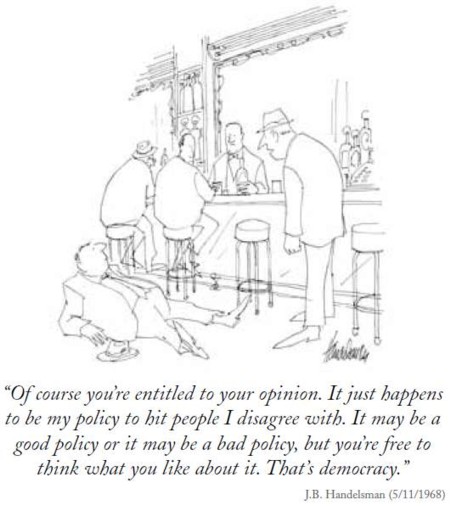Freedom
Freedom's just another word for nothing left to lose,
Nothing, that's all that bobby left for me [82]
One of the core values of our form of democracy is freedom also described as 'liberty'. Soldiers are inspired to kill in its defence, politicians and revolutionaries post it on their banners. But one person's freedom or liberty is often another's constraint, cost or annoyance.
Freedom of speech can mean freedom to incite violence to engage in abuse or otherwise to give offence. Freedom of action could imply the freedom to injure or to put others to risk or to impose costs on others. What is this 'freedom' that we hold so dear?
Philosophers tell us there are three different concepts implicit in popular enunciations of 'liberty' and it is often convenient for politicians to confuse these when lauding 'our hard won freedoms' or 'liberté, égalité, fraternité'.
The meaning given to liberté by some demagogues (as it came to be used in 'the terror' that followed the French Revolution and by some socialist movements) is sinister, this is the so-called 'liberty' to realise one's full potential according to some ideal (to be a valued citizen, a good person, a Christian, a champion swimmer, to be educated). This is sometimes called positive liberty (or constructive liberty) and is of course just another word for 'slavery' to someone else's ideal.
The normal meaning in our society is termed 'negative liberty', the liberty not to have boundaries set, to be generally unconstrained, for example to come and go at will, to make our choices (but still within some framework).
The third meaning has come to be called 'republican liberty' (after the Roman republic) this is 'true liberty' where there is no external constraining principle.

For example with negative liberty your parents might allow you to express any opinion or your employer might allow you to eat at work but with 'republican liberty' no other person has the power to decide if you can or not.
You are free to resign from your job and, if an adult, to leave home but you are not truly free. Any employer you go to will impose rules and protocols and any place you choose to live will also have rules written or not. Simply walking down the street you are expected to obey the laws of the State and to behave according to the normal social conventions.
Thus your freedom is always constrained to one degree or another and the freedoms we have are indeed hard won. These should not be given up lightly. Freedom of opinion and belief, freedom from the imposition of the beliefs of others, sexual freedom (with informed consent), freedom to express one's views, freedom from unnecessary physical constraint, freedom to die when you wish all need to be defended.
We would want to say that a religious group that believes that early abortion or even contraception is murder or that human cell lines are in some way sacred, on the grounds of divine insight, has every right to hold and expound their beliefs (but no right to impose those beliefs on anyone else).
But what if their belief goes further to believing that children should not be immunised or that they should be denied any medical intervention if ill? And what if they believe children should be severely beaten or enslaved or cared for by people who have been denied any normal sexual outlet? Should Society impose limits on their freedoms and actions?
Again we come back to the principle that we need to evolve these rules as we go and be prepared to select that which works in this time and place. We should not be resorting to divine authority or philosophies from the distant past to determine what is right here and now.

